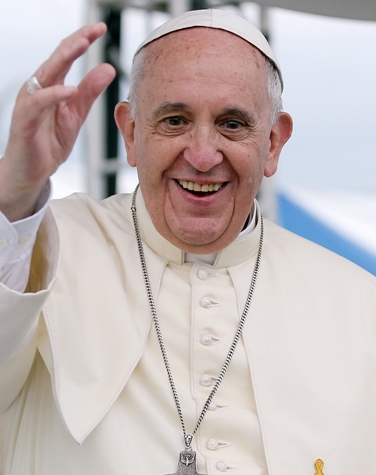Pope Francis on the Environment: Difference between revisions
Siterunner (talk | contribs) No edit summary |
Siterunner (talk | contribs) No edit summary |
||
| Line 21: | Line 21: | ||
○ ○ ○ ○ | ○ ○ ○ ○ | ||
[http://www. | ''Exploiting the earth "is our sin," the pontiff says.'' | ||
[http://www.marketwatch.com/story/the-8th-and-final-deadly-sin-exploiting-the-earth-2014-12-03 This is one of the greatest challenges of our time]: to convert ourselves to a type of development that knows how to respect creation.” | |||
''Pope Francis has called consumerism a “poison.” Earlier this year he warned that “Christians should safeguard Creation,” for if humanity destroys the planet, humans themselves will ultimately be destroyed: | |||
'' | ''He added” ‘Creation is not a property, which we can rule over at will; or, even less, is the property of only a few” capitalists. “Creation is a gift, a wonderful gift that God has given us, so that we care for it and we use it for the benefit of all, with great respect and gratitude.” | ||
○ | ○ | ||
Revision as of 19:29, 15 December 2014
○ ○ ○ ○
CAMPOBASSO, Italy, July 5, 2014 (Reuters) - Pope Francis called for more respect for nature on Saturday, branding the destruction of South America's rain forests and other forms of environmental exploitation a sin of modern times.
In an address at the university of Molise, an agricultural and industrial region in southern Italy, Francis said the Earth should be allowed to give her fruits without being exploited.
"This is one of the greatest challenges of our time: to convert ourselves to a type of development that knows how to respect creation," he told students, struggling farmers, and laid-off workers in a university hall.
"When I look at America, also my own homeland (South America), so many forests, all cut, that have become land ... that can longer give life. This is our sin, exploiting the Earth and not allowing her to her give us what she has within her," the Argentine pope said in unprepared remarks.
Francis, who took his name from Francis of Assisi, the 13th century saint seen as the patron of animals and the environment, is writing an encyclical on man's relationship with nature.
Since his election in March, 2013, the leader of the world's 1.2 billion Roman Catholics has made many appeals in defense of the environment.
○ ○ ○ ○
In May, Sen. Edward J. Markey (D-MA) met with the pope to discuss the importance of acting on the warming planet instead of waiting idly. The week before that visit, Pope Francis compared battling climate change to safeguarding creation, advising the world that “if we destroy creation, creation will destroy us! Never forget this!”
○ ○ ○ ○
Exploiting the earth "is our sin," the pontiff says.
This is one of the greatest challenges of our time: to convert ourselves to a type of development that knows how to respect creation.”
Pope Francis has called consumerism a “poison.” Earlier this year he warned that “Christians should safeguard Creation,” for if humanity destroys the planet, humans themselves will ultimately be destroyed:
He added” ‘Creation is not a property, which we can rule over at will; or, even less, is the property of only a few” capitalists. “Creation is a gift, a wonderful gift that God has given us, so that we care for it and we use it for the benefit of all, with great respect and gratitude.”
○
The green, pro-environmental positions of the Pope place him quite different in current discussion and debate than an 'evangelical right-wing mainstream' where 'domininionism' runs deep in belief and environmentalism is seen as a threat.
This begins with the question of interpretation of biblical ... exhortation in Genesis 1:28: “And God blessed them, and God said unto them, Be fruitful, and multiply, and replenish the earth, and subdue it: and have dominion over the fish of the sea, and over the fowl of the air, and over every living thing that moveth upon the earth.” Many have cited the idea of dominion to justify an anthropocentric view of the world, in which nature exists solely to provide man with its bounty — a position that is often more prevalent in evangelical Protestant circles, especially within the United States.
○
Pope Francis To World Leaders: Consumerism Represents ‘Constant Assault’ On The Environment
“There are constant assaults on the natural environment, the result of unbridled consumerism, and this will have serious consequences for the world economy.”
○
